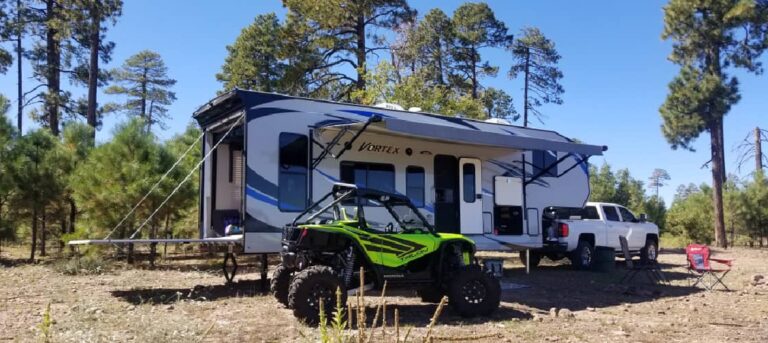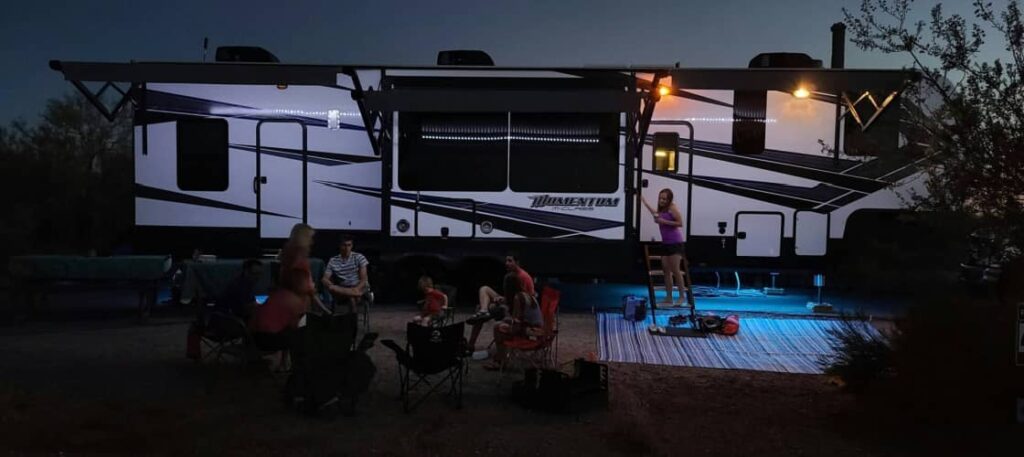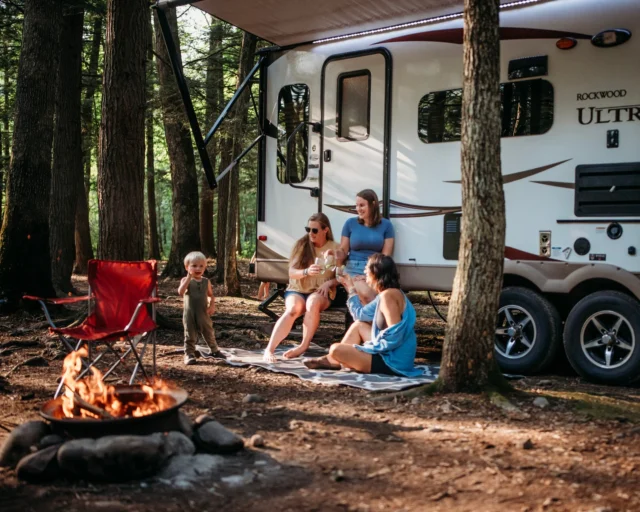
Toy haulers: What exactly are they, and what makes them different from other classes of motorhomes and travel trailers?
Like most other types of RVs, toy haulers come in a wide variety of sizes and styles. What unites them as a class is their unique garage feature. The garage allows campers to bring along large toys like ATVs, golf carts, motorcycles, and other types of adventure gear. It also allows campers to keep those toys out of the living areas of the RV.
Most toy haulers are trailers, but some Class A and Class C motorhomes can haul toys as well.
- What You Need to Know
- Towing a Toy Hauler
- Toy Hauler Manufacturers
- Toy Hauler Rentals
- Toy Hauler Tips
Toy Hauler Trailers: What You Need to Know
In addition to garages, toy haulers are also unique because they have higher-than-average weight limits. This makes them well-suited to carrying toys and other gear.
Built-in cargo doors are usually part of the trailer, providing easy access to the garage. Those doors will often convert to a ramp for loading and unloading kayaks, ATVs, and other fun stuff.
You’ll also find tie-down bars and strap-in systems in the toy hauler garage so your gear won’t slip around while your rig’s in motion.
While a toy hauler is a great option for storing your fun vehicles, an increasing number of people who use them aren’t even hauling toys. If you’re planning a road trip, the extra space in a toy hauler could be used as additional living space, a hobby room, a kids’ bedroom, or an office. It makes a great space for a traveling office separate from the rest of the RV. It’s great for those who need to stay connected with their work while soaking up the RV lifestyle.
Don’t want to add furniture to your RV in order to make the garage space usable? There are queen-size beds that can be raised to the ceiling. Fold-up sofas can also be used in toy hauler campers. These make it easy to maximize living space while keeping the space you need for toys. You could even rig up the door and ramp as an outdoor deck and space for dining.
Towing a Toy Hauler
Obviously, carrying toys is going to add some weight to your rig. Toy hauler RV trailers do have more cargo-carrying capacity, but what can you expect in terms of weight limits?
To calculate a toy hauler’s carrying capacity, subtract the unloaded vehicle weight (UVW, also referred to as dry weight) from the gross vehicle weight rating (GVWR). The UVW includes the weight of full propane and fuel tanks. The GVWR accounts for the maximum weight of the vehicle, fuel, propane, passengers, and cargo combined. The difference between the two is how much cargo and passenger weight you are allowed.
Although the carrying capacity depends on various factors, toy haulers tend to have an average maximum cargo limit of around 6,000 pounds. But a large 40-foot toy hauler can carry up to 12,000 pounds. To put it into perspective, most ATVs weigh less than 1,000 pounds, even when filled with fuel. Many are as light as 400-500 pounds. This means your toy hauler could even carry some small, lightweight cars, like the Mitsubishi Mirage or a smart car.
Of course, if you are towing a toy hauler trailer, you will need to make sure your truck can handle whatever you load into it as well. Generally speaking, it’s good to keep your total load as light as possible. It’s safer, as well as easier on the machinery in the long run. If you overshoot the rated weight limit, you may also forfeit your insurance coverage… so keep an eye on the scale!
| Category | Toy Hauler Trailers |
| Size | 19 – 39 feet |
| Weight | 3,000 – 15,000 pounds |
| Storage | Moderate to extensive, with large garages for ATVs, motorcycles, etc. |
| Sleeping Capacity | 2 – 8 adults |
| Extra Amenities | Spacious garages, fully functional kitchens, bathrooms, generators, fuel stations, slide-outs for space expansion, and optional off-grid capabilities |
| Price Range | $20,000 – $200,000+ depending on the model, size, and luxury features |
Toy Hauler Manufacturers
While the best toy hauler for you depends on your personal needs, a few RV manufacturer brands are consistently top-rated among campers.
- Keystone offers some of the most reliable and high-quality toy haulers on the market. Models like the Keystone Fuzion fifth wheel and the Outback travel trailer stand out as top choices.
- Grand Design is another well-rated manufacturer, and the Grand Design Momentum fifth wheel is a top contender.
- Forest River has several top-notch toy haulers in their lineup, including the XLR Nitro which comes in travel trailer and fifth wheel models. The Wildwood FSX max comes in a variety of versatile travel trailer models.
- Heartland offers a handful of reliable toy haulers, from short travel trailers to 40-foot fifth wheels. If you’re looking for a premium toy hauler with tons of room for family and friends, Heartland’s Road Warrior is a top pick.
- Alliance RV has a top-quality line of toy haulers known as the Valor series. These luxurious, multi-functional RVs are available in several floorplans including fifth wheel and travel trailer options with all the bells and whistles.
- Thor Motor Coach is a widely known and respected manufacturer. The Thor Outlaw is a popular choice for those looking to go with a spacious Class A or Class C drivable toy hauler.
Toy Hauler Rentals
Sometimes it’s best to try before you buy, and it’s easy to check out a toy hauler rental before buying one. RVshare has lots of options, so you can take the trip of your dreams without purchasing an expensive RV that might not be for you.
If you’re renting a toy hauler trailer, as opposed to using a Class A or C toy hauler camper, you’ll need a vehicle large enough to tow the trailer.
Toy Hauler Tips

If you plan to use a toy hauler for a fun weekend or longer trip, here are a few tips to make your experience a pleasant one.
Be mindful of gas mileage
Those extra vehicles or other items in your trailer are going to weigh it down! And the extra weight of your trailer and everything in it is going to affect your gas mileage. Be sure to allot more money for gas on trips where you’re either towing a toy hauler, or your driving a Class A or Class C camper with toys in it.
Frontload your toy hauler trailer
If you’re using a toy hauler trailer, you want to keep the majority of your weight, about 60%, towards the front of your trailer. The weight should be ahead of the trailer axles and should be equally distributed on each side. The back of the trailer can carry about 40% of the weight in your trailer.
Keep your gear secure
Make sure to use straps, bungee cords, and other fasteners to keep all of your toys and other gear in the garage from sliding around while you’re in transit.
Use a brake controller on your trailer
If you’re using a toy hauler trailer, be sure to use a brake controller. This will help prevent swaying and fishtailing while you’re driving.
Be aware of your width
Toy hauler trailers can be wider than standard trailers. If you’re going through a toll booth, across a bridge, or through another space where width is a consideration, make sure you know you can fit ahead of time.
Maintain your toy hauler
Just like any other vehicle, a toy hauler motorhome or trailer will need regular maintenance to ensure it stays in proper working order. You’ll want to perform regular checks on:
- The trailer’s tires: Check for rot and other issues, make sure they’re balanced, and replace them as necessary.
- Onboard appliances and amenities: Items like fridges, toilets, ovens, and other appliances may require specific care and upkeep, just like appliances in a brick-and-mortar home
- The roof and seams: Check and reseal these a couple of times a year. And you will need to keep an eye out for water damage.
Toy hauler trailers do have some parts that other types of rigs don’t have, including moving parts that require attention and care to avoid damage.
- Your garage’s entry ramp will likely need to have its hinges oiled from time to time in order to keep it in good working order.
- You’ll want to ensure that the systems for holding your auxiliary vehicle are in top-notch condition.
Practice parking
For the most part, parking a toy hauler RV is exactly like parking any other RV. You will need to practice backing into a campsite – make sure to have someone spot you. You can level the RV using leveling blocks under the tires, and stabilize it using the included stabilizer jacks.
There are two major differences to keep in mind, however.
- Toy haulers are often bigger than other rigs. If you’ve always had small trailers or motorhomes, remember to keep the size of your RV in mind when choosing your spot.
- You’ll need to leave space to open the garage door in the back of the rig and get your toys down the ramp. This can be tricky in some campgrounds where the sites back up to one another or to a wall. Consider booking a site that is several feet longer than the RV itself, so you have a spot to lower the garage door. Just remember to leave that space behind you when backing in!
Toy haulers are a wonderful option for anyone who wants to bring lots of outdoor gear, small vehicles, or other big items to use camping. If you opt for a toy hauler trailer, you’ll also have your main vehicle right with you. You can unhook your truck from your trailer and use it for sightseeing and transportation.
Hopefully, this guide has shown you the important points of toy haulers to help you decide if one is right for you. You can try one out by renting a toy hauler through RVshare for a weekend or longer trip!






